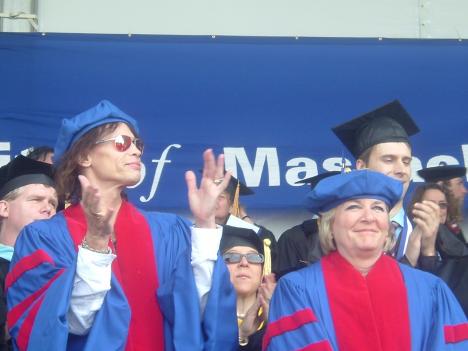Editorial: Campus Military Recruiters Under Fire
May 5, 2005
BY MASS MEDIA EDITORIAL BOARD
The idea of military recruiters on the UMass Boston campus may still stir some uncomfortable feelings in some, considering its been just over two years since the incident between an ARMY reserves recruiter and Professor Tony Vandermeer.
Our locale suddenly felt the pressure of a polarized nation since the incident fell under the limelight of the Iraq invasion.
Immediately following the incident, students began protesting against allowing military recruiters to use our campus as a recruitment site. UMass Boston students were not alone in their protests. Students on campuses nationwide continue to protest the presence of military recruiters on their campuses.
Colleges and universities have the power to ban the military from using their campus as a recruitment ground-but at a heavy price.
The Solomon Amendment, passed in 1996, states that the Secretary of Defense may “deny federal funding to institutions of higher learning if they prohibit or prevent ROTC or military recruitment on campus.”
Colleges and universities are avidly seeking to challenge the decade old law, urging to ban the military from using their grounds for recruitment. The push is strong from law schools-31 law schools have already banned military recruiters-stating that the discriminatory recruitment practices on the basis of sexual orientation are in direct contradiction to the non-discrimination policies of law schools.
Harvard Law School (HLS) Dean, Robert C. Clark, states “Our policy has long provided that any employer who recruits at Harvard Law School and utilizes the services of OCS must sign a statement indicating that it does not discriminate on various bases, including on the basis of sexual orientation. Because the military has not signed such a statement, it has not been permitted to utilize the services of OCS in the past.”
The massive coalition of 31 law schools banning military recruiters spawned similar movements across colleges and universities of all sorts. If the ruling for law schools stands, other colleges and universities would have the right to create similar bans.
Since the law passed in 1996, most schools had worked out compromises. For example, while HLS didn’t allow direct recruitment through regular recruitment programs and facilities, they were allowed to circumvent the ban by recruiting through the HLS Veterans Association.
But after the attacks of September 11, 2001, the pentagon has been increasing pressure on the law schools to cease their bans. In 2002, HLS removed their ban stating the U.S. military will once again “be allowed access to the facilities and services of the Law School’s Office of Career Services.” The reason, “In light of the Solomon Amendment, our refusal to permit military recruiters access to the services of OCS would make the entire University ineligible for appropriations from the Departments of Defense, Transportation, Health and Human Services, Education and related agencies.” In other words, because of the HLS ban, the entire university risked loosing $328 million in federal funding.
Supporters of the Amendment displayed their might and distaste for schools upholding the ban with threatening language saying they wanted to “send a message over the wall of the ivory tower of higher education,” said Richard Pombo (R-CA), co-sponsor of the Amendment. Pombo further stated, ” [The universities] starry-eyed idealism comes with a price. If they are too good, or too righteous, to treat our nation’s military with the respect it deserves, then they may also be too good to receive the generous level of taxpayer dollars presently enjoyed by many institutions of higher education in America.”
Many other law schools followed suit.
In 2004, however, HLS reinstated the ban citing that the Solomon Amendment violates the schools First Amendment rights while the remaining coalition challenged the law as entirely unconstitutional.
Last year, the US Court of Appeals sided with the coalition. On Monday, the Supreme Court agreed to consider the case.
The intimidation from the Pentagon has left institutions scrambling unfairly. In 2002, an editorial from Georgetown states, “The fact remains that though Georgetown’s policy is fundamentally opposed to the action demanded by the government, the university must, out of fiscal necessity, comply.”
If universities like Harvard and Georgetown were forced to comply because of the heavy financial risks, one can only imagine the severe pressure UMB would be under-after all, where UMB stands on the issue isn’t a secret.
Since the multiple wars on terrorism the US has waged all over the world, the Pentagon has become increasingly dependent on college campuses to recruit the manpower they require to keep the wars going. Our campus is in a unique position. Because of the large number of working students, our campus has become feeding ground for the military promising overworked and underpaid students a tuition reimbursement or federal loan repayment of up to $65,000. It is tempting for many, which is why they join-and subsequently get stuck.
Our take? Instead of getting all our students stuck in the ARMY Reserves, they should take a hike once and for all.





















































